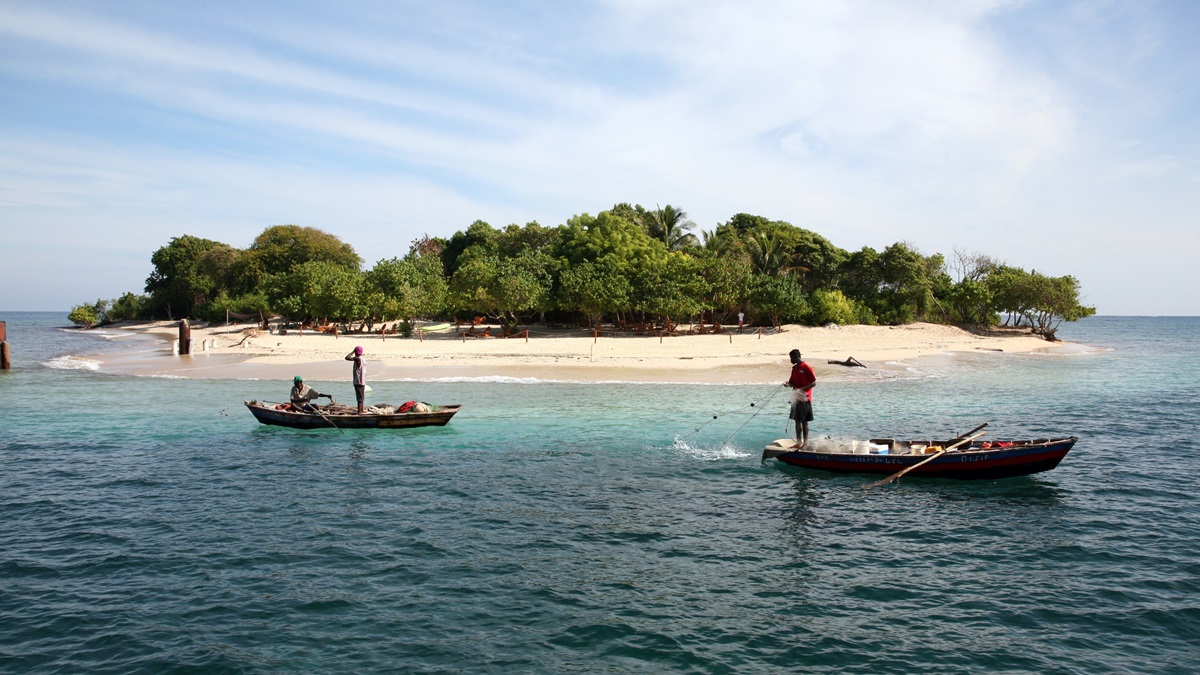With support from UNCTAD and partners, the Caribbean nation has revved up efforts to leverage its rich aquatic resources to promote sustainable value chains and trade.
© Shutterstock/mikeledray | Haitians fish on the western Caribbean waters near the Port of Labadee.
Haiti’s 1700-kilometre coastline and vast exclusive economic zone in the Caribbean Sea and Atlantic Ocean offer the country a rich and diverse marine ecosystem.
As a key provider of food and nutrition, fisheries and aquaculture hold strategic importance for the Caribbean nation, the only least developed country in the Western Hemisphere.
Small-scale fishing has long provided a crucial social safety net for many Haitians, with artisanal fisheries contributing over 82% of the country’s total fish production.
An estimated 115,000 Haitians work in fishing and related activities. About 28% are women, working informally as vendors and providing livelihoods for over 416,000 people.
“The fisheries and aquaculture sector in Haiti offers real opportunities for investment, improved post-harvest processing, value addition and job creation, particularly for women and the young,” said Paul Akiwumi, UNCTAD’s director for Africa and least developed countries, sharing insights from a recent study.
But the sustainability and competitiveness of Haiti's fisheries sector are hindered by challenges related to the country’s political instability, outdated legal framework, limited enforcement capacity and lack of modern equipment.
Also, illegal and unregulated fishing, in part due to weak governance, increasingly puts pressure on Haiti’s marine resources. Several fish stocks have been exploited beyond sustainable limits for years.
Strengthening fisheries and aquaculture management
In response to Haiti’s challenges, UNCTAD and the International Labour Organization collaborated on a year-long emergency support project with funding from the UN Joint Sustainable Development Goals Fund to tackle global food, energy and financing crises.
The project, completed in May 2023, mapped out gaps in Haiti’s regulatory, enforcement and productive capacities that were hindering sustainable management mechanisms in its fisheries and aquaculture sector.
UNCTAD also helped mobilize partnerships and formulate a plan to develop the sector in selected priority zones in the country’s South, South-East, and Grande Anse departments.
A key aspect of the project involved conducting policy research and analysis on international fisheries access agreements and providing the Haitian government with specialized drafting and negotiations advice.
Towards higher value and productivity
Despite the export potential of Haiti’s abundant aquatic resources, most of the fish harvested is consumed domestically, with limited processing to add value or improve the income of the many operators along the fisheries and aquaculture value chains.
Sustainably upgrading the sector hinges on striking a careful balance between conservation, exploitation and utilization.
To help, the joint project pinpointed key policy areas to incentivize aquaculture operations and improve processing, safety and quality control to meet global market requirements.
These include:
- Address the legal and institutional frameworks for fisheries and aquaculture management, particularly Haiti’s competition laws related to scientific research for fisheries, coastal resource management and key products such as shrimp and eels.
- Create an enabling environment and incentives to promote the sector’s socioeconomic development – for instance, by establishing a surveillance centre to monitor fisheries and aquaculture sector activities and enforce laws.
- Upgrade key infrastructure – such as marine spatial planning – to improve landing, post-harvest practices and marketing.
- Build the government’s capacity to implement policies and regulate the sector by stepping up training at national and local levels and enhancing the capability of the private sector to export fish products that meet international standards.
- Facilitate public and private investment in the fisheries and aquaculture sector. This can be done through inclusive consultations with key stakeholders – such as international organizations, industry associations and institutional donors – to validate and prioritize actions.

